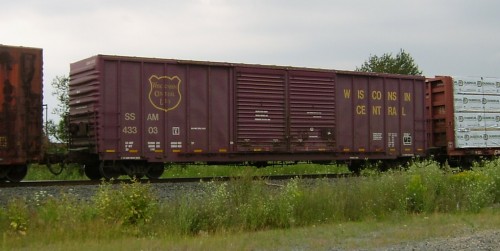In addition to the several board lumber mills served by the ACR and its nearby connections discussed previously, several other mills produced additional types of wood products.
Plywood
In Hearst, the J.D. Levesque Plywood mill produced and shipped out plywood in boxcars. I’ve seen photos of this mill in the late 1990s with several double-door WC boxcars spotted for loading (and a few recently unloaded AC pulpwood flatcars), and prior to the WC era, cars provided to the mill would have been CN cars (as CN served the plant and the AC rostered no boxcars). While not directly served by the AC, loads to central or western Canada (via Oba) or central US (via Sault Ste. Marie) would have traveled over the ACR line.
In 1995 this mill was purchased by Columbia Forest Products which still operates it today producing hardwood plywood.
Veneer
Two veneer mills operated on the ACR.
At Searchmont there was a mill operated by Weldwood of Canada (sold to G.W. Martin Co. in the early 1980s). This closed in 1990, and the abandoned mill buildings were finally demolished in 2014.
In Sault Ste. Marie, the mill operated [during the early 1980s] by Weyerhaeuser appears to have produced both board lumber and veneers. This mill was sold to G.W. Martin in the mid 1980s, later changing hands to E.B. Eddy and then Domtar. It was last sold to Boniferro Mill Works in 2003 and appears to still be in operation today.
Since the AC did not have any boxcars for interchange service, any cars for southbound loads may have been provided by CP or SOO during the 1980s.
OSB and Chipboard
The last category of wood products we’ll examine is engineered wood products such as oriented strandboard (OSB) and chipboard. OSB (what I used to call chipboard due to its appearance, but apparently the industry seems to use that term synonymously with particleboard) is an engineered product made from compressing wood chips with adhesives into sheets like plywood. (OSB is the sort of stuff you’d use for cheap sheathing on an outdoor shed. Particleboard is a similar product but with finer wood fiber like sawdust – the sort of thing you’d find in a cheap furniture from a big-box store.)
In late 1995 a new OSB mill was constructed near Limer, south of Hawk Junction. The mill was operated by Jager Strandboard Ltd., a joint venture between H.J. Forest Products and MacMillan Bloedel. When Weyerhaeuser bought out MacMillan Bloedel in 1999, they assumed ownership of the mill. The mill closed in 2007 as part of a series of Weyerhaeuser mill shutdowns due to the decline in the forest industry at the time. While it was in operation it both received raw pulpwood logs on flatcars and shipped out finished products in boxcars. In 2013, the idled mill was purchased by an American company called Rentech, which retooled the mill to produce wood pellets (which would have been shipped in large capacity covered hoppers). However in early 2017 the mill was idled and the company went bankrupt later that year.
Update: In summer 2022 it was announced that the shuttered mill was being acquired by Forex and will be restarting as Wawa OSB Inc.
Also in 1996 a new particleboard plant opened in the west end of Sault Ste. Marie under the name GP Flakeboard. This was original a joint venture with Georgia-Pacific but is now owned by a Chilean company, Aurauco and simply know as Flakeboard. This plant also saw large expansions around 2005 and produces particleboard and medium-density fiberboard (MDF). This mill is located out to the west of Sault Ste. Marie and appears as if it may actually be served by Essar Steel Algoma’s private railway. It uses sawdust from other sawmills in the Northern Ontario region as its raw material; which otherwise would have been waste material. The Flakeboard plant is still in operation today.



look at back issues of logging and sawmilling journal
I have an interesting story about the Weldwood mill at Searchmont. Way back in February of 1979, my senior year of H.S., I traveled with a buddy from lower Michigan to ride the ACR Agawa Canyon Snow Train. It was a beautiful, frigid morning, with absolutely calm air, clear skies, and -32f temperature. As we rounded a curve approaching Searchmont, we saw what looked like an atomic weapon mushroom cloud in the distance. As it turned out, it was just an immense column of steam rising from the operation of the Weldwood mill!